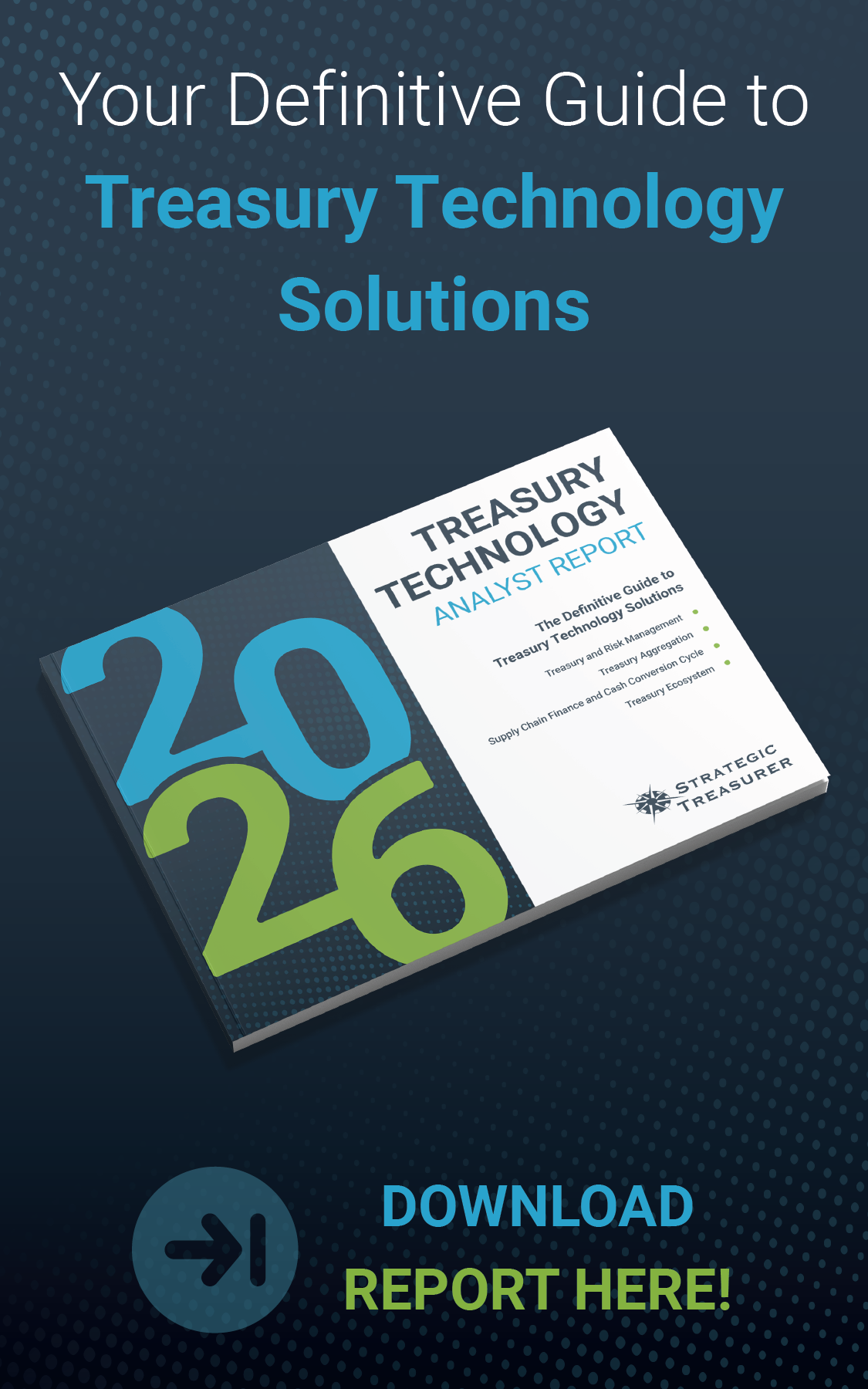
Episode 193
The Impact of the Ukraine Conflict on Treasury
Strategic Treasurer released a flash survey probing what implications the conflict in Ukraine has had and will have on treasury. With roughly 100 survey respondents, you will see results in the following categories: impacts already being felt, preparing for repercussions, economic & business concerns, and awareness & expectations.
Download the report here: strategictreasurer.com/conflict
Speaker:
Craig Jeffery, Strategic Treasurer


Subscribe to the Treasury Update Podcast on your favorite app!
Episode Transcription - Episode #193: The Impact of the Ukraine Conflict on Treasury
INTRO 0:05
Welcome to The Treasury Update Podcast presented by Strategic Treasurer, your source for interesting treasury news, analysis, and insights in your car, at the gym or wherever you decide to tune in.
Nicki Gillispie 0:20
Strategic Treasurer ran a flash survey on the impact of the Russian invasion of Ukraine. Approximately 100 respondents answered seven questions about this conflict, and I’d like to hear your thoughts on the data. Let’s begin with the impact. What has already happened and what is expected to happen?
Craig Jeffery 0:36
Yeah, thanks, Nicki, and thanks to everybody who responded to the survey, you know, so the impact of the Ukraine conflict on Treasury. The first question was, are you already experiencing a direct impact on your business operations? And this came back 44% had indicated Yes, there was a direct impact on their business operations or supply chain so far. So, this is fairly fast results of having an impact far more than we had expected. So, we would postulate that this is more related to the sanctions and how that’s had an impact across the board on what people buy. What they spend. So, four out of nine had already identified that but, Nicki, I think the other part of your question goes to what’s expected. So, the next question was, do you think the conflict will have a direct impact on your business operations or supply chains? So, this is a forward look and that jumps up to 74%. So, just under three quarters, expected to have an impact, now, significant, or moderate totaled 26%, minor impact is just under 50%. No was 17%, 8% we’re unsure at this early stage in this invasion. I guess what we’re saying is that the impact is looks to be broad in terms of impacting the majority of companies in some way. Yet the total significance, people that think it’s moderate or significant, it falls down to about a quarter of the company. We might guess that some of that’s due to the size and nature of Russia’s economy, what they feed into the overall supply chain, things that relate to food production, whether it’s wheat directly, urea, other things that go into making fertilizers that then translate into food production or oil and some of the metal. So, we think that that’s where those numbers are coming from. Russia is, by some measures, the 11th largest economy in the world. So, it’s not miniscule, but it’s fairly small. And so, the impact looks to be moderate to significant on about a quarter of the firms.
Nicki Gillispie 2:42
Thank you for that. So, for research and preparation, it seems that the majority of firms are preparing, responding, or reacting. What does this look like?
Craig Jeffery 2:52
We’re asking people throughout finance, most clearly, treasury and treasurers are responding. The idea the concept of preparing for the future, looking ahead is key and core to treasury, more than any other area of finance we would say. And so, the question about has management, treasury or corporate asked for additional information on the potential impact of the conflict and remember, these are early days, but there’s a slight majority, 51%, indicated that there had been additional information asked for. You know, do we have exposure to Russian banks, rubles, anything probably related to oil, what the expectations there might be around energy. This shows that people are responding fairly quickly to look at, gather some additional information on what the exposure might be. But we asked another question on this short survey about have you done any research or running models as the potential impact of this conflict on your organization? So, we saw this as a way to ask in more detail and I would invite people to look at the infographic you can download more information. You can see that in the show notes at strategictreasurer.com, monitoring, amorphic and gathering of information, data or news that was just under 60%. The next one I think is really quite interesting is 55% identified risk or exposures. So, they looked at, where are we exposed? And then from that there’s additional discussion, so 53% held meetings or calls or had calls on this topic. What I thought was fairly interesting from this is 16%, or about one and seven, have run models or engaged in creating scenarios to account for different situations–could be foreign currency volatility, what would that look like? It could be price changes, interest rates–one in six have run models or scenarios to identify how they would respond to this. And so, due to the magnitude, it was worth a look by the majority of companies. And then I think as they’ve evaluated what their potential impact is, a subset of those a much smaller subset, identified that there’s enough of enough of a risk to take the next step. This was very good foresight and planning an early preparation to respond to potential impacts here.
Nicki Gillispie 5:18
Now looking at the responses regarding economic and business concerns, it seems that supply chain is the largest. Can you identify any key or notable points here?
Craig Jeffery 5:28
Yeah, so 54% identified trade or supply chain impacts as their biggest concerns. I was ranked number… 4%. We dropped down to 46% just below half indicating cost of energy. And this is flows from Russia being a significant provider of energy, more so directly to the Europeans, but certainly that had a big impact. And then there’s the flows of the impact as we move down to overall rate of inflation or cost of goods. This impact on supply chain impact on some of the materials and sanctions. It goes down to interest rates of 43%, other commodities at 40% and just under 40%–39% indicated FX price volatility was a significant economic or business concern. So, quite a few concerns here, Nicki, across the board between the 40 and 55% of respondents identified.
Nicki Gillispie 6:27
And the final two questions from the flash survey touch on cyber-attacks or threats and the possible expansion of the conflict outside its current theater. What do you think we need to know?
Craig Jeffery 6:37
A couple of things, one from our survey and one from what’s happening with some of the government entities. So, the question was: Has your company encountered more cyber threats since Russia invaded Ukraine? 17% said yes, so this is just over one out of six have said that this has increased. That’s in a fairly short time, I mean, this was in just over a week from the start of the invasion of Russia attacking Ukraine. That’s pretty significant data. That’s more than I was suspecting, but there’s a bigger warning here other than 70% have already indicated it. CISA from the US government there’s a group that now requires reporting from a particular industries, those that are critical infrastructure industries, like energy, financial services, there’s 16 or 19 of these infrastructure industries that have to report more quickly on certain situations like, for example, ransomware, you have to report within 72 hours, if you’ve been subjected to a ransomware attack, if you’ve paid a ransom you have to report that within 24 hours if you’re in one of these industries. So, these warnings are becoming quite strong, quite severe. There’s a faster reporting mechanism in the US–not a reporting mechanism, but a reporting requirement. The government’s concerned about this, and we’re seeing an uptick here in cyber threats since this invasion. So, I think that bears really close watching from a companywide perspective. But I think this, you know, treasury needs to be mindful of this as well because that can impact your ability to move cash or business operations. That creates some cause for concern. And to your second question, Nicki about the size and scope we asked the question: Do you think the conflict will expand beyond the direct Ukraine theater during 2022? In other words, will fighting go outside the borders of Ukraine? Now this is not truly a treasury question or finance question, but it’s a broader question. You know, there’s obviously concerns about will article five of NATO be invoked if there’s any kind of attack on a NATO country? What could happen here? 45% said yes, they believe that the conflict will expand beyond Ukraine during 2022. For yes and no, 45 and 55%. That’s worth noting that’s a fairly significant. Negative expectation that this could expand into a bigger situation. So, however we factor these items in, 45% of your peers think that this could expand, which is a significant concern among many of what that would mean, but if feels fairly significant that 45% believe it could expand outside Ukraine during 2022. So, we’re now third week of this attack. Its brutal. It’s difficult and it’s having an impact on finances and treasurys, as well. You know, if we set aside the human and humanitarian side of things, there’s a flow into the, into the financial side. And that’s really the focus of this survey. The other parts are a significant concern as well, but this survey research is focused on the treasury finance supply chain, impact of this conflict.
Nicki Gillispie 10:08
Thank you for your insights and that is all the questions we have for today.
Craig Jeffery 10:14
Thanks, Nicki, and everybody who took the survey thank you and the show notes are down below. You should be able to see where you could download the infographic from this. Thank you.
OUTRO 10:27
You’ve reached the end of another episode of The Treasury Update podcast. Be sure to follow Strategic Treasurer on LinkedIn, just search for Strategic Treasurer. This podcast is provided for informational purposes only, and statements made by Strategic Treasurer LLC on this podcast, are not intended as legal, business, consulting, or tax advice. For more information, visit and bookmark strategictreasurer.com.
Related Resources
This survey, underwritten by Deluxe, looks at various practices and plans for modernizing and automating AP and AR processes. The influence of recent disruptions, calibration of various pain points that drive change, and other motivators to upgrade AP and AR processes will be examined.
On this episode of the 2022 Outlook series, Host Craig Jeffery joins Royston Da Costa, Assistant Group Treasurer at Ferguson plc, to discuss the outlook of quantum computing. They explore this developing technology, discuss how it’s relevant to finance and treasury, reveal which companies are using it now and its impact on cybersecurity.







